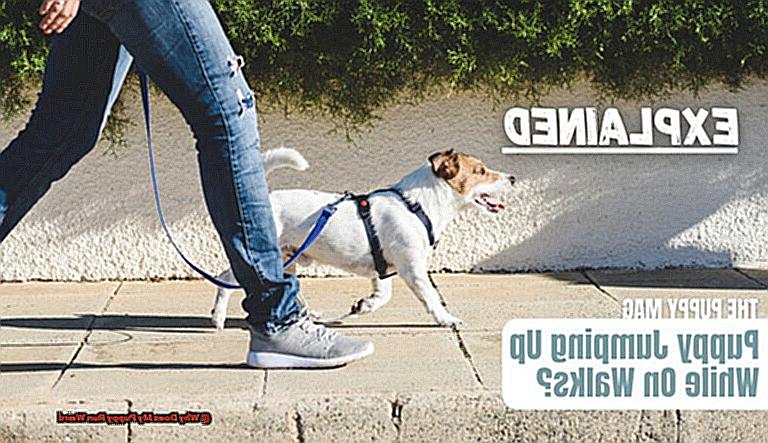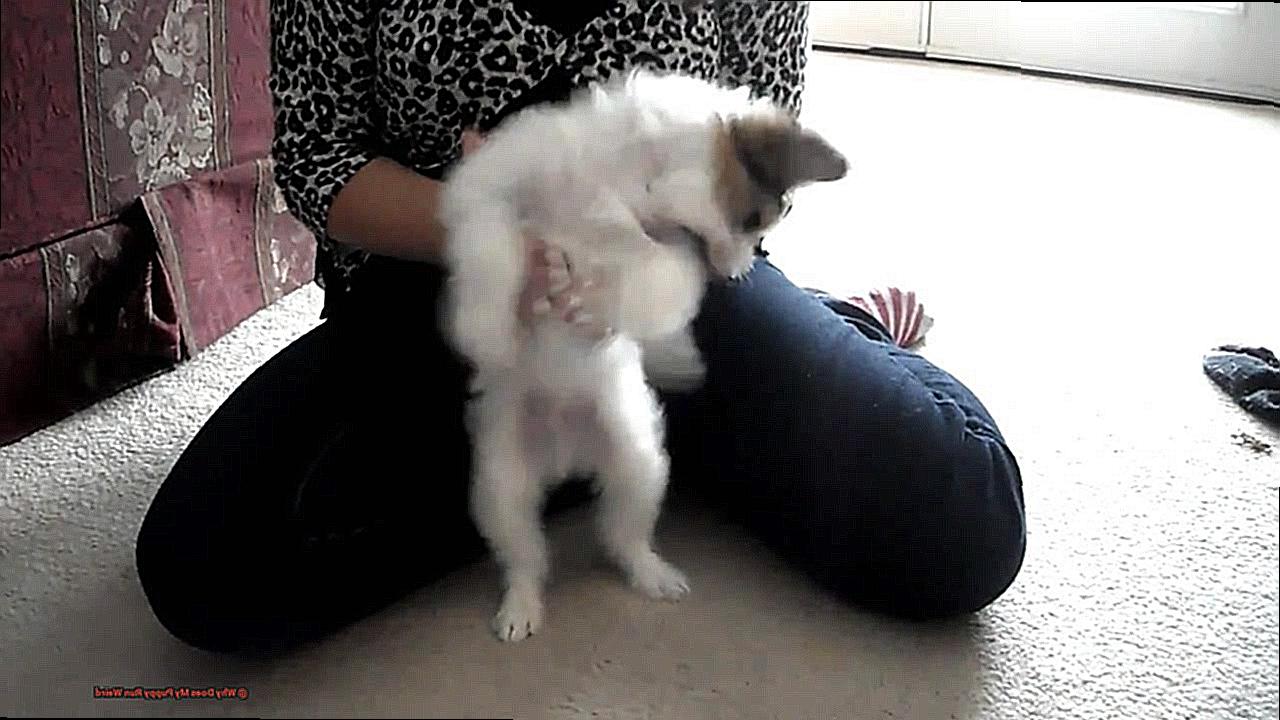Why Does My Puppy Run Weird?
Imagine this: you’re strolling along with your new puppy, basking in the warm sun and breathing in the crisp air. Suddenly, your little ball of fur starts zooming around in circles, his back legs struggling to keep up with his front ones. You can’t help but think to yourself, “Why does my puppy run so strangely?”
As a dog owner, it’s natural to feel concerned when your furry companion displays odd behaviors. And let’s be real, watching a puppy run awkwardly can be both hilarious and worrisome at the same time. But fear not, you’re not alone in questioning this peculiar running style.
In this blog post, we’ll delve into the reasons behind why puppies run weird and what you can do to help them develop proper running techniques.
So, grab a cup of coffee (or tea) and join me as we explore the fascinating world of puppy running.
Why Does My Puppy Run Weird?
Contents
- 1 Why Does My Puppy Run Weird?
- 2 The Unique Body Structure of French Bulldogs and its Impact on Running
- 3 Potential Health Issues that Can Affect a Puppy’s Running Behavior
- 4 Recognizing Signs of Anxiety and Stress in French Bulldog Puppies
- 5 Creating a Calm and Safe Environment for Your Puppy
- 6 Exercise, Playtime, and Positive Reinforcement: Managing Anxiety in French Bulldogs
- 7 Tips for Training Your French Bulldog to Run Properly
- 8 Conclusion
As a French bulldog owner, you may have noticed your puppy running in a strange, awkward manner and wondering, “Why does my puppy run weird?” While French bulldogs are known for their playful and energetic nature, their unique body structure and health issues can sometimes affect their running habits.
In this blog post, we will explore the possible reasons for your puppy’s weird running and what you can do to help them.
Hip or Joint Problems:
One of the most common reasons for a French bulldog puppy to run weird is due to hip and joint problems. These issues are especially prevalent in larger breeds and can cause discomfort and difficulty in walking or running.
If your puppy has trouble getting up or shows signs of pain while running, it’s essential to consult with a veterinarian to determine if they have hip dysplasia or other joint issues.
Muscle Weakness:
If your puppy is not getting enough exercise or has an underlying condition that affects their muscle strength, they may run weirdly. This can be especially noticeable during their growing stages as they go through growth spurts. As responsible owners, it’s crucial to provide our puppies with regular exercise to keep their muscles strong and healthy.
Excitement or Nervousness:
Puppies are still learning how to control their movements and can get easily excited or nervous. This can cause them to run erratically or in short bursts. While this may seem strange, it is entirely normal for puppies to exhibit this behavior.
With proper training and socialization, your French bulldog puppy can learn how to manage their emotions and run more smoothly.
Poor Breeding:
In some cases, puppies may inherit certain physical traits from their parents that can affect their running ability. For example, if both parents have short legs or flat faces, it’s likely that their offspring will also have these characteristics.
As a result, their running may be different from other breeds, but this does not necessarily mean it’s weird or wrong. It’s essential to understand your puppy’s breed and embrace their unique qualities.
Injury or Pain:
If your puppy has suffered an injury or is experiencing pain, they may run in a strange way to compensate for the discomfort. It’s crucial to pay attention to any changes in their gait and seek professional help if necessary. A vet can properly assess your puppy and provide the necessary treatment to alleviate their pain and improve their running abilities.
The Unique Body Structure of French Bulldogs and its Impact on Running
Why Your French Bulldog’s Short Legs and Elongated Soft Palate Can Affect Their Running Abilities
As a proud French Bulldog owner, you may have noticed that your furry friend has a unique running style that sets them apart from other dog breeds. It’s no surprise considering their distinct body structure, which makes them prone to certain health issues and also impacts their movements. In this section, we will dive deeper into how the short legs and elongated soft palate of French Bulldogs can affect their running abilities.
Short Legs = Short Strides
One of the most noticeable features of French Bulldogs is their short and stocky build, with a large head and short legs. While this gives them an adorable and compact appearance, it also means that they cannot run as fast or for long distances compared to other breeds. This is because their bodies are not built for endurance.
Due to their broad chest and compact body, French Bulldogs have a difficult time taking long strides and maintaining speed. This can result in a funny or awkward gait while running, making it seem like they are bounding instead of running smoothly.
Elongated Soft Palate = Breathing Difficulties

Another aspect of French Bulldogs’ body structure that affects their running is their elongated soft palate. This fleshy tissue at the back of their throat can become swollen or elongated, causing breathing difficulties. As a result, your pup may take shorter strides or even pant excessively while running, making their movement appear odd.
Higher Center of Gravity = Wobbly Gait
French Bulldogs also have a higher center of gravity due to their top-heavy bodies and short legs. This can cause them to lose balance easily while running, resulting in a wobbly or clumsy gait. If you notice your pup frequently tripping or falling while running, it may be due to their unique body structure.
Not All Bulldogs Run The Same
It’s important to note that not all French Bulldogs will have the same gait or running style. Just like humans, each dog has its own unique way of moving based on factors such as age, weight, and overall health. However, the breed’s distinct body structure does play a significant role in how they run and can contribute to them appearing “weird” while doing so.
Potential Health Issues that Can Affect a Puppy’s Running Behavior
As French Bulldog owners, we all know how energetic and playful our furry friends can be. So, when we notice that our puppy is running weird or differently from other puppies, it can be a cause for concern. As an expert on potential health issues that can impact a puppy’s running behavior, I want to share my insights on this topic to help you better understand and support your French Bulldog’s unique running style.
Hip Dysplasia: A Common Condition in French Bulldogs
One of the most common health issues that can affect a puppy’s running behavior is hip dysplasia. This condition occurs when the hip joint does not develop properly, causing pain and discomfort when the puppy moves or runs. While it is more commonly seen in large breed dogs, French Bulldogs are also prone to this condition due to their body structure. Their broad chest and narrow hindquarters put extra strain on their hips, making them more susceptible to hip dysplasia.
Patellar Luxation: A Cause for Limping or Hopping While Running
Another potential cause for a puppy’s abnormal running behavior is patellar luxation. This occurs when the kneecap becomes dislocated from its normal position, causing the puppy to run with a limp or hop on three legs. This condition is more commonly seen in smaller breeds like French Bulldogs and can be genetic or caused by trauma. If you notice your puppy limping or hopping while running, it’s best to consult with a veterinarian to determine the cause and proper treatment.
Injuries: A Common Occurrence in Energetic Puppies
Puppies are known for their playful and energetic nature, but their boundless energy can sometimes lead to injuries. Sprains or strains can occur from playing too rough or landing awkwardly while jumping or running. It’s essential to monitor your puppy’s activity and provide a safe environment to prevent these types of injuries.
Neurological Conditions: A Possible Cause for Uncoordinated Movements
Certain neurological conditions can also affect a puppy’s running behavior. For example, cerebellar hypoplasia is a condition where the cerebellum (a part of the brain responsible for coordination and balance) does not develop properly. This can result in uncoordinated movements and difficulty with running. If you suspect your puppy may have a neurological condition, consult with your veterinarian for proper diagnosis and management.
Recognizing Signs of Anxiety and Stress in French Bulldog Puppies
French bulldog puppies are known for their adorable and playful nature, bringing endless joy and entertainment to their owners. However, just like humans, these furry bundles of energy can also experience anxiety and stress. As an expert on recognizing signs of anxiety and stress in French bulldog puppies, I am here to share valuable insights on why it is important to be aware of these signs and how it can impact the well-being and behavior of our beloved companions.
What Are the Signs of Anxiety and Stress in French Bulldog Puppies?
French bulldog puppies are not always able to express when they are feeling anxious or stressed, so it is important for owners to pay attention to their behavior. Some common signs of anxiety and stress in French bulldog puppies include:
- Excessive Panting: If your puppy is panting heavily even when they are not hot or after minimal physical activity, it could be a sign of anxiety or stress.
- Pacing: Puppies may pace back and forth in a repetitive manner when they are feeling anxious or stressed.
- Trembling: Shivering or trembling is a common sign of anxiety and can be accompanied by other behaviors such as hiding or avoiding eye contact.
- Destructive Behaviors: Chewing on furniture, excessive barking, or digging can be a result of your puppy trying to cope with stress and anxiety.
- Unusual Running Patterns: French bulldog puppies are known for their energetic running style, but if you notice your puppy constantly circling or running in short bursts, it could be a sign of underlying anxiety or stress.
Why Is It Important to Recognize These Signs?
It is crucial for owners to recognize these signs as it can affect the overall well-being and behavior of French bulldog puppies. Untreated anxiety and stress can lead to physical health issues, such as digestive problems and weakened immune system, and can also impact their mental health, causing behavioral issues like aggression and separation anxiety. By recognizing these signs early on, owners can take necessary steps to alleviate their puppy’s stress and improve their overall quality of life.
What Can Cause Anxiety and Stress in French Bulldog Puppies?
There are various factors that can contribute to anxiety and stress in French bulldog puppies. Some common causes include:
Separation Anxiety: Puppies are social animals and can experience anxiety when left alone for extended periods of time.
Creating a Calm and Safe Environment for Your Puppy
As a proud owner of a French Bulldog puppy, it’s important to understand the significance of creating a calm and safe environment for their overall well-being. Puppies, just like human babies, are highly sensitive to their surroundings, and a chaotic environment can greatly impact their behavior. As an expert in creating a peaceful atmosphere for puppies, I have gathered some valuable insights and tips to help prevent behavioral issues in your furry friend.
How a Chaotic Environment Can Affect Your Puppy’s Behavior
Puppies are naturally curious and energetic, but when they are constantly surrounded by chaos and loud noises, they can become overwhelmed and anxious. This can lead to unusual behaviors such as running weird or excessive panting. A cluttered and chaotic living space can also make it challenging for puppies to find a safe and comfortable spot to rest, which can result in destructive behaviors.
Tips for Creating a Calm and Safe Environment
Creating a calm and safe environment for your French Bulldog puppy doesn’t have to be complicated. By following these simple tips, you can ensure that your puppy feels secure and content in their surroundings:
- Provide a designated sleeping area: Just like humans, puppies need their own space to relax and unwind. Providing a designated sleeping area with a comfortable bed or crate can give them a sense of security.
- Keep the space clutter-free: Cluttered spaces can be overwhelming for puppies and make it difficult for them to navigate. Keeping the living area tidy and organized can help create a sense of calmness for your furry friend.
- Use soothing scents or music: Certain scents like lavender or chamomile can have a calming effect on puppies. You can also play soft music or white noise in the background to create a peaceful ambiance.
The Role of Routine in Creating Stability for Puppies
Puppies thrive on routine, and it can greatly help in creating a sense of stability and security for them. Make sure to establish a daily routine for feeding, playtime, and potty breaks. This will not only help with their physical needs but also provide a sense of predictability for your puppy.
Exercise, Playtime, and Positive Reinforcement: Managing Anxiety in French Bulldogs
French bulldogs are known for their energetic and playful nature, but sometimes, too much of a good thing can lead to anxiety in these lovable dogs. As responsible owners, it’s important to recognize the signs of anxiety and take steps to manage it effectively. In this blog post, we’ll discuss how establishing a routine for exercise and playtime, incorporating positive reinforcement techniques, and providing mental stimulation can help manage anxiety in French bulldogs.
Establishing a Routine for Exercise and Playtime
Just like humans, dogs thrive on routine. By establishing a consistent schedule for your French bulldog’s exercise and playtime, you can help reduce their anxiety levels. Stick to a set time and duration for these activities, and avoid overstimulating play that can cause them to become overwhelmed. It’s also essential to provide plenty of breaks during playtime, as French bulldogs are prone to overheating and exhaustion due to their short snouts.
Positive Reinforcement Techniques
Positive reinforcement is a powerful tool in managing anxiety in French bulldogs. By rewarding calm behavior and redirecting their attention to a calm activity, you can help them learn to relax in stressful situations. For example, if your dog starts exhibiting weird running behaviors such as pacing or circling, try redirecting their attention to a puzzle toy or practicing obedience training using treats as rewards.
Mental Stimulation is Key
In addition to exercise and play, mental stimulation is crucial for French bulldogs. These intelligent dogs need mental challenges to keep them engaged and prevent boredom and anxiety. Incorporate puzzle toys, obedience training, and other mentally challenging activities into your routine to help reduce your French bulldog’s anxiety.
Consult with a Veterinarian
If you’ve tried managing your French bulldog’s anxiety through exercise, playtime, and positive reinforcement techniques but they continue to exhibit weird running behaviors, it’s best to consult with a veterinarian. They can rule out any underlying medical conditions that may be causing the behavior and provide additional guidance on managing your dog’s anxiety.
Tips for Training Your French Bulldog to Run Properly
First and foremost, it’s important to understand the unique body structure of French bulldogs. These brachycephalic breeds have shortened skulls and snouts, which can affect their breathing and make it challenging for them to engage in physical activities. That’s why it’s crucial to start with a proper warm-up before any exercise. Take your Frenchie for a short walk to get their blood flowing and their muscles warmed up before running.
Training your French bulldog to run properly also requires patience and positive reinforcement. Use treats and praise to encourage them to run in a proper form. This will help them associate running with something positive and make the training process more enjoyable for both of you. Remember to keep the training sessions short and slow at first, gradually increasing the intensity and duration as your Frenchie builds up their stamina.
Proper form is essential for any dog’s running technique, including French Bulldogs. Train your Frenchie to run with their legs slightly wider apart to prevent any joint issues in the future. Consider using a harness instead of a collar to provide better support for your Frenchie’s body while running and prevent any strain on their neck or back.
It’s also important to keep an eye on your Frenchie during training sessions for any signs of fatigue or discomfort. If they start panting heavily, slowing down, or showing signs of pain, it’s time to take a break and let them rest. And remember, never force your Frenchie to run if they seem uncomfortable or unwilling.
In addition to proper training techniques, there are other factors that can contribute to a French bulldog’s weird running behavior. It’s crucial to consult with your veterinarian to make sure your puppy is healthy enough for physical activity. They can also provide guidance on how much exercise is appropriate for your Frenchie based on their age, weight, and overall health.
Also Read: Home Remedies For Your Bulldogs Congestion
Conclusion
In conclusion, as pet owners, it’s natural to feel worried when our puppies display unusual running behaviors. In this blog post, we have delved into the various reasons behind why puppies run weird and how we can help them develop proper running techniques. From physical factors such as hip or joint problems, muscle weakness, and unique body structure to emotional factors like anxiety and stress, there are many potential causes for a puppy’s odd running style.
As French bulldog owners, it is crucial to understand their distinct body structure and how it can affect their running abilities. With their short legs and elongated soft palates, Frenchies may have different stride lengths and breathing patterns compared to other breeds. However, with patience and proper training techniques, your Frenchie can learn to run comfortably.
We also discussed potential health issues that may contribute to a puppy’s abnormal running behavior. These include hip dysplasia, patellar luxation, injuries, and neurological conditions. It is essential to pay attention to any changes in your puppy’s gait and seek professional help if needed.
Moreover, we shared tips on creating a calm and safe environment for your Frenchie to reduce anxiety and stress levels. This includes incorporating exercise, playtime, positive reinforcement techniques, and mental stimulation into their daily routine.
Lastly, we provided some practical tips for training your French bulldog to run correctly by understanding their unique body structure and using positive reinforcement methods. Remember always to consult with your veterinarian before starting any physical activity with your Frenchie.
In conclusion, while seeing our puppies run weirdly may be concerning at first glance, there are many reasons why they may do so. By understanding these reasons and taking proactive steps towards helping our furry friends develop proper running techniques, we can ensure they stay healthy while enjoying their energetic nature.




